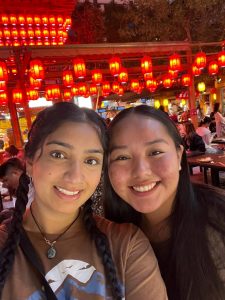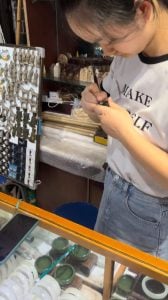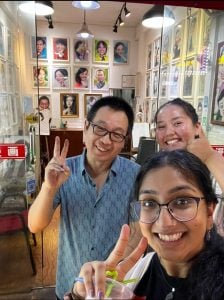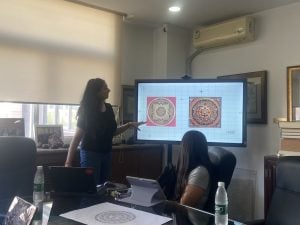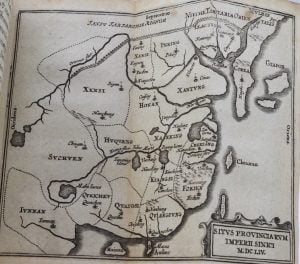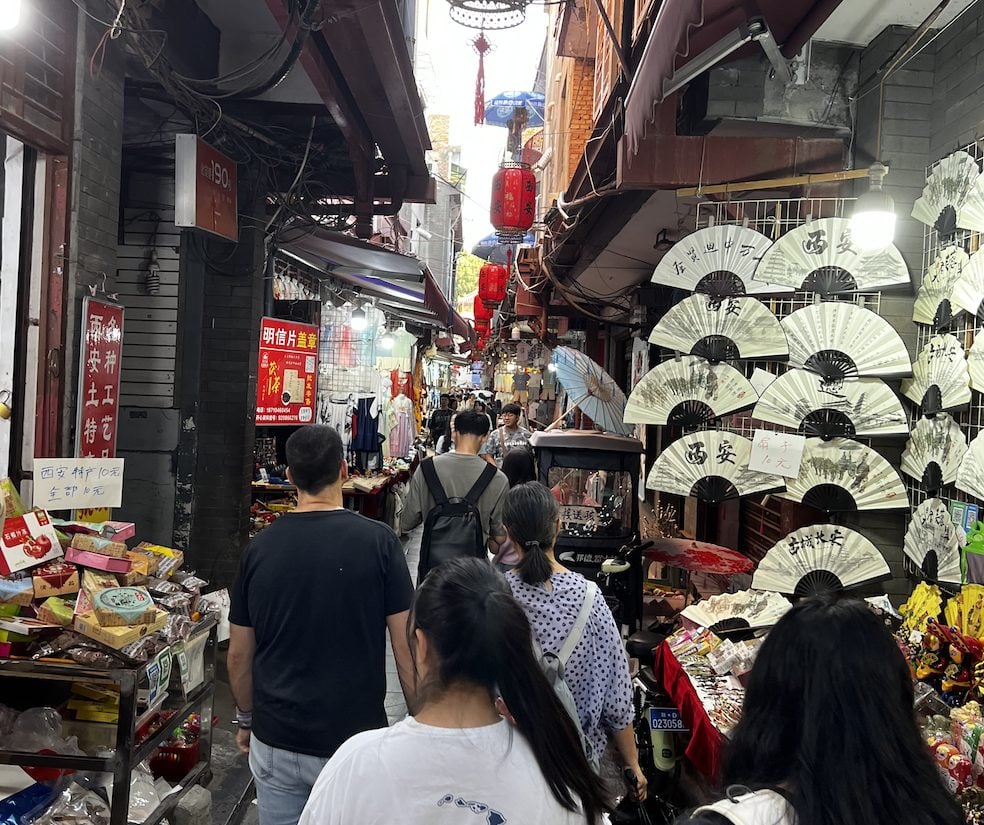
Night Markets on the Silk Road
Before arriving in China, many of my close Chinese friends and neighbors would tell me tips and tricks on navigating the markets as if they were treacherous roads. At that time, I didn’t take it too seriously. I already had some sense of what night markets are like from previous experiences in Asian countries, so I was confident I knew how it worked. I had no idea how vital those tips would be on the Silk Road Excursion this semester.
My previous experience in a night market was in Pakistan, another country in Asia, where I visited as a child. I remember being dragged along the streets, the grip of my mom’s hand around my wrist tight so as to not lose me in the crowd. I was shorter than some of the tables, but the colorful array of jewelry, fabrics, and shoes would still spill over and allow me to touch when my mom’s attention waivered. The few small streets making up the market were loud and lively; people yelling out prices and bargaining while others talked about the quality of the silk fabric. I remember being told not to speak English and to always talk in Urdu but that too…very quietly. I always thought telling a kid to talk quietly in such an active place was a bit ridiculous, but I would soon learn it was for good reason. If I spoke English or if my English accent was at all noticeable in my Urdu- and God forbid the shop owners heard it – it would be like wearing a target on my forehead saying, “overseas customer.” My mom would have to suffer the consequence and have to bargain harder for a cheaper price. I was soon to learn this experience of being a foreigner, or at least not a local to a night market, was a unique experience of its own.
On the Silk Road Excursion, there were two grand night markets that we experienced – both with their fair share of moments that will be remembered for the rest of my life. The first of which was in Xi’an. We had just arrived at Xi’an after voyaging on a 12-hour overnight train, touring the Terracotta Warriors, and visiting The Great Mosque. Our teacher then let us loose to experience the Hui Night Market on our own, and it was crowded with people. My friend Pasheen and I started from The Great Mosque which to me almost felt like the middle of the street market. We planned to explore our way out of the maze starting with what felt like the center. Standing in The Great Mosque I was already a bit lost on how to get back to the hotel but luckily for me, Pasheen has amazing navigation skills.
Exiting the mosque felt like alleyways on alleyways of small and large shops set up one after another. In this part of the market, there were little to no decorations set up like I stereotypically imagine night markets to have. However, the gifts, jewelry, and souvenirs which I like to call “trinkets” were already so colorful they filled the streets with a glowing aura. As someone susceptible to gift shops, I was bound to get in trouble here. I remember being worried about standing and looking around at one shop for too long. If we lingered, shop owners would begin approaching us. Pasheen and I, having no confidence in our Chinese speaking skills, would instantly scramble away. That is until we came across one store that caught my eye. Although the store was placed on top of the stairs, tables of goods cascaded out to attract the eyes of on-lookers like me. I laid eyes on an assortment of keychains all with different animals from the Chinese zodiac. For the first time, I built up the courage to ask the shop owner how much they were. After being satisfied with the 3 for 10-yuan deal, I bought some key chains and went on my way.
The previous interaction had me feeling more confident in my Chinese skills. I might’ve been a little overconfident and thought, hmm maybe night markets aren’t as hard to operate as everyone was making it out to be.
The next store we stopped at I didn’t mean to buy anything. I stopped by the table that had jaded or marbleized Chinese zodiac animals for stamps. We, of course, didn’t know they were stamps and were simply intrigued at the sight of them. The mistake we made was picking them up one by one, trying to find our animal signs. Immediately, the shop owner ran over telling us which ones were the most popular and began helping me find the horse which is my Chinese zodiac. In the end, there were no horse stamps, so I wasn’t all that interested anymore, but the shop owner stayed insistent. Handing me things, and showing me new items we hadn’t picked up, Pasheen and I didn’t know what to do or how to leave. I asked the price of one that I thought looked nice and she said it was 300 yuan. Even with my limited time in China, I knew that seemed very inflated for something like that. I then offered 100 yuan mistakenly thinking it was a fair place to start. Eventually, I settled for 180 yuan.
After agreeing, the shop owner asked for my Chinese name and began carving it onto the bottom of the figure. It was then that we learned what I had just bought for 180 yuan was a stamp that I could’ve gotten for 30 yuan anywhere else. I remember turning to Pasheen and whispering, “I think I just got scammed.” She laughed at me and whispered back. “Yeah, you definitely did.”
Luckily, the rest of the night was spent without getting swindled too much. We got many more chances to practice our Chinese skills without too much miscommunication by buying bracelets and small souvenirs. We accepted the fact that we were probably paying higher prices than what was fair, but we had to accept defeat. The most memorable souvenir was a portrait done by a street artist. Even then we ended up paying a higher price than was listed at the front of the store, but the artist’s quirky and high-energy personality made up for the few extra yuan.
By the end of the Silk Road Excursion, we had a lot of chances to build confidence in our Chinese speaking skills. I knew I had to put it to the test at the night market in Dunhuang, one of the last stops before making it back to UIBE. Entering the night market of Dunhuang was a little different from Xi’an. For starters, we had a better understanding of how everything worked and how to be careful, so we don’t get taken advantage of as foreigners. This market looked a little different too. There were decorations and lights hung up making it a magnificent, festival-like sight. Instead of just having small street vendors for snacks, they had bigger food courts with an array of foods. The shops were not set up in alleyways and stores on the side of never-ending streets, but as vendors in an open space. Pathways formed by the placement of vendors making it a bit different from navigating Xi’an’s Hui Street market. This time I was specifically on the lookout for bracelets, something that is abundant at almost every vendor.
I had a sense of how much one bracelet should be and decided my goal would be to not buy a bracelet for anything more than 15 yuan- up to 30 if it’s nice. Cruising along the market I realized some things were the same as in Xi’an. Most vendors carried items that were not very unique to just their little shop. I saw the same 50 bracelets repeatedly with prices varying from 10 yuan if the owner was nice, to 50 yuan if the owner wanted to take advantage of us unfortunate foreigners. One shop had particularly nice bracelets that seemed of higher quality than the rest. I lingered at this shop a little while examining a few I really wanted. I decided to ask the owner, who was already hovering over me, for the price. “80 yuan.” he said. Pasheen and I shared a quick glance knowing that was an extravagant price for a bracelet. I simply said sorry in Chinese and tried to leave.
“How much do you want it for?” The shop owner stopped us before we could head out. There the bargaining began. With my limited Chinese, I said no more than 30 yuan at which the store owner scoffed and turned his back to me. We thought that meant it was really over in this shop this time and tried making our way out at which he stopped us again. He began trying to convince us of the quality and popularity of the bracelet, telling us why the price he listed was already a good bargain. Every time he reduced the price by 5 yuan I turned around as if ready to leave only for him to come after me again trying to convince me to buy his inflated bracelet. By this point in the night, I had learned to say no and walk away if vendors grew too insistent but the bracelet at this vendor was unique and something I really wanted so I only pretended to leave. Every time I did so, I would hear another price drop and knew I was getting closer to my goal.
By this point Pasheen grew embarrassed of my insistency. It reminded me of when my sisters and I would get embarrassed by my mom at night markets in Pakistan when she would get into yelling matches to get something at the price she wanted. Although there was no screaming happening here it felt like a rite of passage being able to get a shop owner to reduce the price over and over until you got it to where you’re willing to buy it. Eventually the shop owner gave me the bracelet and I settled it for around 40 yuan. It was still higher than the price I originally wanted but better than my previous “bargain” in Xi’an.
Over the duration of the Silk Road Excursion, I have brought back many souvenirs and items that will remind me of my time in various cities like Xi’an and Dunhuang. I know that when I return to the US, I will be gifting some of the items bought at the night markets to my friends and family. With every item, I have stories to tell including the incident in Xi’an and the small victory in Dunhuang. Although I have yet to visit night markets in Beijing and surrounding cities, it’s something I am looking forward to doing before the end of my study abroad experience in China. Since the Silk Road Excursion, I have practiced and learned a lot of Chinese and I can’t help but wonder how much better I will be at bargaining than when I was in Dunhuang. Other than language skills, bargaining requires an unwavering mindset where you have to be ready to say no and walk off or argue for the price you want. Something I had to get used to in China.
Previously, I have always been shy in situations where I must bargain to get the ideal price for something. My mom would say it was my American upbringing that made it hard for me to bargain. Being used to set, non-bargainable prices, I find it awkward to suggest lower prices than the initial price set by the owner. Perhaps, this is the reason why shop owners at night markets know foreigners are the most susceptible to high prices. However, next time I visit Pakistan I am determined to use the mindset I have fostered in the various night markets of China to not shy away from fighting for a good bargain.
By Nabeeha Misbah, Fall 2023 student



